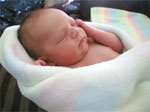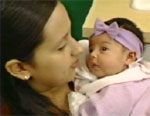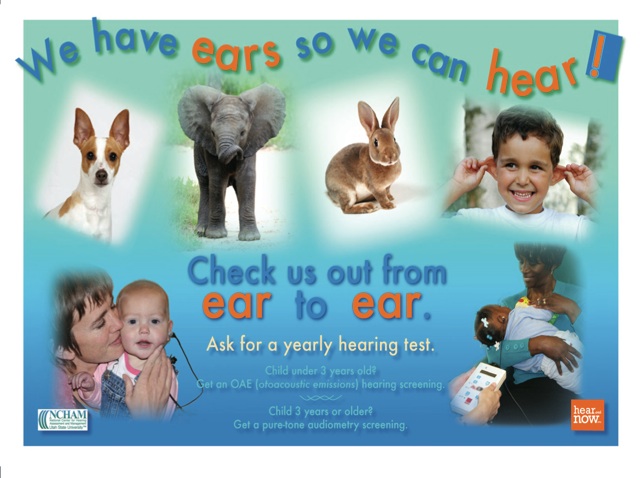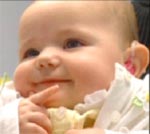|
|
What do I do if my baby failed a hearing screening test?
 The newborn hearing screening test tells us which babies need more testing. Some babies who fail the screening test have normal hearing, but up to one in three babies who fail will have a permanent hearing loss. When a hearing loss is found early, there is much that parents and professionals can do to help a child develop normally. This is why it is important for you to complete any follow-up testing recommended by the screening program. You may be asked to bring your baby back to the hospital for another screening test or you may be told to see a hearing specialist (audiologist). If you are sent to an audiologist, be sure to find out whether the audiologist has the right equipment to test infants and young children. Also ask how many young children the audiologist has treated over the past year. Hearing is VERY important to a baby's development, so don't delay—help your child hear and now! The newborn hearing screening test tells us which babies need more testing. Some babies who fail the screening test have normal hearing, but up to one in three babies who fail will have a permanent hearing loss. When a hearing loss is found early, there is much that parents and professionals can do to help a child develop normally. This is why it is important for you to complete any follow-up testing recommended by the screening program. You may be asked to bring your baby back to the hospital for another screening test or you may be told to see a hearing specialist (audiologist). If you are sent to an audiologist, be sure to find out whether the audiologist has the right equipment to test infants and young children. Also ask how many young children the audiologist has treated over the past year. Hearing is VERY important to a baby's development, so don't delay—help your child hear and now!
Get help finding someone who can do follow-up hearing testing
Learn more about newborn hearing screening and why some children need follow-up testing
Was my baby's hearing screened?
 During the early months of life, babies who have a hearing loss often act just like babies who can hear. You would not be able to tell if your baby isn't hearing the words you speak or the songs you sing. That is why a hearing screening test needs to be done using special equipment. The test takes only a few minutes for a trained screener to perform and most hospitals do the screening before the baby is discharged. Screening programs often tell parents about their baby's results with a card or letter. Most programs also send a letter to the baby's doctor. As a parent, you need to know for sure if your baby had a hearing screening test and what the results were. During the early months of life, babies who have a hearing loss often act just like babies who can hear. You would not be able to tell if your baby isn't hearing the words you speak or the songs you sing. That is why a hearing screening test needs to be done using special equipment. The test takes only a few minutes for a trained screener to perform and most hospitals do the screening before the baby is discharged. Screening programs often tell parents about their baby's results with a card or letter. Most programs also send a letter to the baby's doctor. As a parent, you need to know for sure if your baby had a hearing screening test and what the results were.
Get help finding out whether your baby's hearing was screened
- Ask your baby's doctor or nurse if the newborn hearing screening results are in your baby's medical record. Find out if your baby passed the hearing screen or if more testing is needed.
- Contact your hospital's nursery to find out if they have a hearing screening program. Ask the Hearing Screening Coordinator how you and your doctor can get a copy of your baby's hearing screening results.
- Contact your state's Early Hearing Detection and Intervention Program or call 866-997-HEAR (4327)
Learn more about newborn hearing screening and why some children need follow-up testing
How can I have my child's hearing tested?
 Hearing loss can happen at any time. Most children are screened at birth for hearing loss but are not tested again until they are in school. Although doctors can look into a child's ear to check for infection or blockage in the ear canal, most do not have the equipment needed to perform a true hearing screening. If you would like to have your child's hearing tested, you need to ask your doctor where that can be done. If your child is 0 - 3 years of age, ask for an Otoacoustic Emissions (OAE) hearing screening. Older children can be screened using pure tone audiometry. It is likely that your doctor will need to refer you to a hearing specialist (audiologist) who has the proper equipment and training to test hearing. Hearing loss can happen at any time. Most children are screened at birth for hearing loss but are not tested again until they are in school. Although doctors can look into a child's ear to check for infection or blockage in the ear canal, most do not have the equipment needed to perform a true hearing screening. If you would like to have your child's hearing tested, you need to ask your doctor where that can be done. If your child is 0 - 3 years of age, ask for an Otoacoustic Emissions (OAE) hearing screening. Older children can be screened using pure tone audiometry. It is likely that your doctor will need to refer you to a hearing specialist (audiologist) who has the proper equipment and training to test hearing.
Get help finding out whether your child's hearing is normal
- Discuss your concerns with your child's doctor or nurse. Ask whether your doctor has a way to check for permanent hearing loss.
- Temporary hearing loss may be caused by an ear infection. This type of loss can often be diagnosed and treated by your doctor. If the ear infection lasts longer than three months, your doctor should send you to a specialist.
- Permanent hearing loss is diagnosed and treated by a pediatric audiologist—a hearing specialist who knows how to work with children. If your doctor sends you to an audiologist, be sure to find out if the audiologist has the right equipment to test infants and young children. Also ask how many children they have seen in the past year.
- Contact your state's Early Hearing Detection and Intervention Program or call 866-997-HEAR (4327)
Learn more about how babies learn language and why hearing screening is important.
- Check how your child's hearing and language compare with developmental milestones:
- Birth to 3 Months of Age
- Blinks or jumps when there is a sudden, loud sound
- Quiets or smiles when spoken to
- Makes sound like "ohh" and "ahh"
- 3 to 6 Months of Age
- Looks for sounds with eyes
- Starts babbling ("baba", "mama", "gaga")
- Uses many sounds, squeals, and chuckles
- 6 to 9 Months of Age
- Turns head towards loud sounds
- Understands "no-no" and "bye-bye"
- Babbles, for example "baba", "mama, "gaga"
- 9 to 12 Months of Age
- Repeats simple words and sounds you make
- Correctly uses "mama" and "dada"
- Responds to singing or music
- Points to favorite toys and objects when asked
- By 24 Months of Age
- Has a word for almost everything
- Uses 2-3 word sentences
- By 36 Months of Age
- Strangers are able to understand much of what the child says
- Uses verbs ending in "ing" such as walking or talking
- Watch a 6-minute video about newborn hearing screening
- Watch a 60-second video about hearing screening in early childhood education settings
- Watch a 2-minute sing-along video preparing young children, teachers and parents for OAE hearing screening
- Watch a 22-minute video about hearing screening for infants and toddlers
- Read a short explanation about the benefits of OAE screening and how it is done. [PDF]
- Read more about hearing screening, diagnosis and intervention
- Listen to what it sounds like to have a hearing loss.
Why is hearing so important for children?
 Even before babies are born, they can hear sounds from the outside world. Newborns are especially sensitive to the sound of the human voice. As babies watch their parents' faces, and hear them speak and sing, they are learning to communicate. Their hearing systems develop every day from the sounds they hear. A baby also learns to interact with people during the first months of life. By about 3 months, most babies will smile when spoken to. By 6 months they will begin to babble and imitate simple sounds. By one year most will say their first word! Children who can't hear will often have trouble doing these things or learning how to speak. It will be hard for them to learn and to interact with other people. Even before babies are born, they can hear sounds from the outside world. Newborns are especially sensitive to the sound of the human voice. As babies watch their parents' faces, and hear them speak and sing, they are learning to communicate. Their hearing systems develop every day from the sounds they hear. A baby also learns to interact with people during the first months of life. By about 3 months, most babies will smile when spoken to. By 6 months they will begin to babble and imitate simple sounds. By one year most will say their first word! Children who can't hear will often have trouble doing these things or learning how to speak. It will be hard for them to learn and to interact with other people.
Learn more about how babies learn language and why hearing screening is important.
- Check how your child's hearing and language compare with developmental milestones:
- Birth to 3 Months of Age
- Blinks or jumps when there is a sudden, loud sound
- Quiets or smiles when spoken to
- Makes sound like "ohh" and "ahh"
- 3 to 6 Months of Age
- Looks for sounds with eyes
- Starts babbling ("baba", "mama", "gaga")
- Uses many sounds, squeals, and chuckles
- 6 to 9 Months of Age
- Turns head towards loud sounds
- Understands "no-no" and "bye-bye"
- Babbles, for example "baba", "mama, "gaga"
- 9 to 12 Months of Age
- Repeats simple words and sounds you make
- Correctly uses "mama" and "dada"
- Responds to singing or music
- Points to favorite toys and objects when asked
- By 24 Months of Age
- Has a word for almost everything
- Uses 2-3 word sentences
- By 36 Months of Age
- Strangers are able to understand much of what the child says
- Uses verbs ending in "ing" such as walking or talking
- Watch a 6-minute video about newborn hearing screening
- Watch a 22-minute video about hearing screening for infants and toddlers
- Read more about hearing screening, diagnosis and intervention
- Listen to what it sounds like to have a hearing loss.
|



